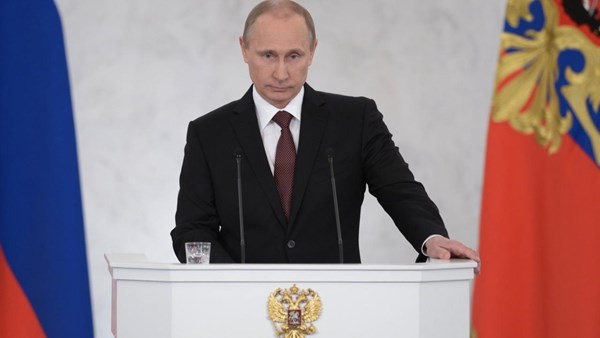Putin threatens NATO with military response if Ukraine is accepted into Alliance
Russia will give a military-technical response to the West if it continues its policy of aggressive behavior, said Russian President Vladimir Putin at a board meeting of the Defense Ministry.
According to him, Moscow "has every right" to ensure its security and sovereignty amid the threat of NATO’s expanding military infrastructure, which, if deployed to Ukraine, will reduce the time the enemy missiles can reach Moscow to 7-10 minutes.
"What is happening now, the tension that is developing in Europe, is their fault," Putin said, referring to the United States.
According to the president, the "so-called victory in the Cold War" caused a state of euphoria in the United States and led to an incorrect assessment of the situation and wrong decisions - the expansion of NATO, withdrawal from the Anti-Ballistic Missile Treaty and support for separatism in the North Caucasus in the 1990s.
"They do what they want," Putin said and continued: "But what they are now doing in the territory of Ukraine or trying and planning to do, is not a thousand kilometers from our national border, it is at the porch of our home. They need to understand that we simply have nowhere else to retreat."
According to Putin, armed conflicts, bloodshed are by no means Russia's choice. "We do not want such a development of events," Putin assured. "We want to resolve issues by political and diplomatic means, and at least have clear, understandable, clearly stated legal guarantees."
The Russian Foreign Ministry has published proposals for such guarantees. In a proposed draft agreement with NATO, which was handed over to U.S. Assistant Secretary of State Karen Donfried, who visited Moscow, the Kremlin demands that NATO withdraw to the 1997 borders, which means withdrawing troops and equipment from the bloc's Eastern European members.
Russia also demands NATO stop its enlargement, including through the admission of Georgia and Ukraine, as well as abandon "any military activity" in the territory of Eastern European states, the countries of Transcaucasia and Central Asia.
"We hope to get a clear, comprehensive answer to them. There are some signals that the partners seem to be ready to talk," said Putin , without specifying what signals he was talking about.
On Sunday, German Defense Minister Christine Lambrecht rejected the Russian ultimatum, saying Moscow has no right to decide which countries may or may not join NATO.
Three days earlier, NATO’s Secretary General Jens Stoltenberg confirmed that there were no plans for a compromise. He assured that Georgia and Ukraine "eventually" will become NATO members in accordance with the decision of the summit in Bucharest in 2008.
"The alliance's support for Ukraine does not pose a threat to Russia," Stoltenberg assured.
But the Russian president has a different picture in his mind. “By creating hypersonic weapons that will be deployed to neighboring countries, they will push extremists to Russia, including certain regions of the Russian Federation, say, in the Crimea," he said.
"Do they think we don't see these threats, or do they think that we will look limply at the threats posed to Russia? This is the whole problem, we simply have nowhere to retreat - that's the issue," Putin said.
The proposals put forward by Russia are obviously unacceptable for NATO, and Moscow cannot fail to understand this, said Steven Pifer, a professor at Stanford University and a senior expert at the Brookings Institution, and in the past - the US ambassador to Ukraine, former director for Russia and Eastern Europe at the US National Security Council.
"The public disclosure of such draft documents is an unusual diplomatic practice. The way the Russian side presented its requests suggests that the Kremlin does not make a serious bet on negotiations," he argues.
According to Pifer, the obviously impossible ultimatum can be used in the future as a pretext to start military actions against Ukraine.
